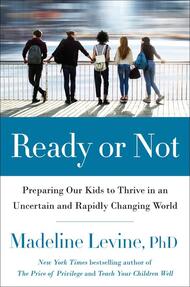 I recently finished reading Ready or Not: Preparing Our Kids to Thrive in an Uncertain and Rapidly Changing World by Madeline Levine. I think I heard about it from another author whose work I also enjoyed. It reminded me a bit of How to Raise an Adult, which also tackled the issues of over-involved/over-protective/helicopter parenting. Levine approached the issues through the lens of a psychologist who works with kids of all ages, and it was eye-opening to hear about some of the cases/issues she has seen firsthand. She presents a lot of good guidelines and tips, most of which revolve around doing less and letting kids do work and develop for themselves. I also liked the sections that focused on the parents and how she encourages them to live their own lives that don't revolve around their kids 24/7. I enjoyed this book and recommend it to other parents who may be prone to getting over-involved with their own kids. Below are some of my main notes and takeaways.
1 Comment
 Wow, how much I enjoyed reading Super Thinking: The Big Book of Mental Models by Gabriel Weinberg and Lauren McCann! I listened to the audio book and was annoyed by how much I had to pause it since I was taking so many notes. This book was recommended to me by a colleague, and I am really grateful for the recommendation. It's like a combination of psychology, business, startups, and even relationship/family advice, all in one book of principles and models that can apply to many aspects of life. While there were not that many "brand new" models that I encountered, I really liked how the book pulled so many of them together and illustrated them with concise clear examples. I greatly enjoyed Munger's books on similar topics, and this one incorporates many of his teachings and adds similar ones from lots of different fields as well. And it's cool that it was written by another software entrepreneur and dad! Below are my main notes and takeaways. I highly recommend getting the book and reading it.  The process of building the automated candy dispenser was a roller coaster and definitely an example of the Pareto principle, where 20% of the details took 80% of the time. I learned a lot through the experience and hope to have made a lot of kids happy. On the technical side, I learned about Arduino boards, basic programming, libraries, shields, and their IoT Cloud and Web Editor. I also learned about some of the capabilities and limitations of Alexa Routines and Skills. On the non-technical side, I learned that it's important to know what you're good at and not to be afraid to ask for help for other things (the software, electronics, and programming took me a few hours, but all the mechanical/building/cutting/drilling was a lot more tricky and new for me so I needed to ask for help from family with all that); I also learned that duct tape can do a lot but not everything, and if something doesn't work with duct tape to try a better (ideally mechanical) method. Below you can read about the engineering process I went through, some of the design decisions, review of prior art, and areas for future work that I identified. |
Archives
June 2024
Categories
All
Subscribe |
 RSS Feed
RSS Feed
